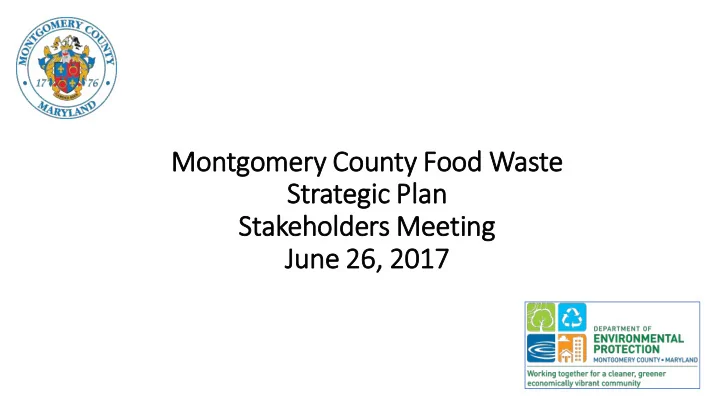

Montgomery ry County Food Waste Strategic Pla lan Stakeholders Meeting June 26, , 2017
Overview • Progress towards Montgomery County’s recycling goal • Food waste is our next frontier • Council Bill 28-16 calls on DEP to develop a Food Waste Strategic Plan • Need to focus on the many aspects of reducing food waste, redirecting excess food to others with unmet needs, increasing recycling, and using compost more 2
Montgomery County’s Integrated Solid Waste Management System Reduce Waste Reuse Items and Materials Recycle Compost Convert Waste to Energy Landfill 3
Montgomery County’s Waste Reduction & Recycling Goal 70% by 2020 4
Steady Increases in Recycling 625,407 Tons of materials recycled in CY 2015 56% recycling rate 61% waste diversion rate Per Maryland Waste Diversion Rates & Tonnages 1/31/17 5
Solid Waste Management 10 Year Plan 2012 -2023 2023 …”Examine the feasibility of targeting additional materials types for recycling including food waste generated at restaurants, schools and institutions. Work with MDE to clarify regulations governing the permitting and operation of food residual composting so as to remove impediments to the development of new food residual composting facilities in our region. Within six months of adoption by MDE of new and comprehensive regulations governing the siting, permitting, construction and operation of food composting facilities in Maryland, DEP will develop a strategy to contractually obtain access to or promote the development and use of food waste composting capacity to service Montgomery County waste generators. Continue to conduct pilot projects and establish best management practices for food residuals collection, transportation and processing. Continue to evaluate innovative collection techniques to increase cost-effective recycling of all kinds.” Source: Comprehensive Solid Waste Management 10 Year Plan - Page 5-12 6
Generators of f Food Waste Estimated food waste generated in CY 2015: approx. 151,144 tons • Largest generators providing greatest opportunity • Restaurants, grocery and food-related businesses • Schools • Institutions • Large-scale senior living communities • Other generators • Single-Family Households Source: Montgomery County Waste Composition Study 2013 as applied to total tons generated in CY 2015 • Multi-Family Properties 7
Current County Efforts to Reduce and Recycle Food • Utilize sources of data to identify sources of food waste, and evaluate opportunities • Pursue capacity at food waste processing and/or compost facility(ies) • Investigate the state of food recycling and market conditions • Food recycling facilities (compost and AD) • Collectors providing collection services 8
Current County Efforts (continued) • Conduct Demonstration Food Scrap Recycling Project • Best practices developed through first-hand experience • Conduct outreach and education, provide technical assistance to businesses, schools, institutions, multi- family properties • Coordinate, as appropriate, with other local jurisdictions on food waste 9
CB 28-16 Requires Strategic Plan for Food Waste 10
Emphasis of f CB 28-16 16 • Reduce the unnecessary generation of food waste • Divert excess consumable food to others with unmet needs • Advance composting • Encourage use of finished compost 11
Strategic Plan to Advance Composting, g, Compost Use and Food Waste Diversion Per Council Bill 28-16, DEP will: These elements include: • Legislative changes; • • Identify/examine many County policies/initiatives; • Models/best practices; elements in reducing food • Metrics for assessing diversion, composting; waste and increasing • Goals/target dates; composting • Challenges/means of overcoming challenges; • Make comprehensive and • Potential sites for food waste composting far-reaching operations; recommendations • Environmental/public health benefits; and • Consult with substantial • Cost estimates, potential economic benefits set of stakeholders and interested parties 12
Our Approach • Establish stakeholder working groups to work on issues • Each working group prepares documents that address issues raised • Documents are reviewed by other working groups • Opportunity to discuss documents • County will compile documents into draft Strategic Plan • Stakeholders will review draft Plan • County will prepare the final Plan; submit to County Council 13
Consult with Stakeholders • Identify stakeholders • Conduct initial and follow-up meetings with stakeholders • Seek stakeholders’ expertise in plan development • Receive input on draft strategic plan • Hold work sessions for feedback, input 14
Working Groups • Reducing food waste/channeling food to others • Backyard composting & community-scale composting • On-site institutional/on-site business composting • On-farm composting • Commercial composting* in Montgomery County • Strategies to maximize collection at the curb *other technologies may be considered 15
Is Issues for Each Topic Area • Objectives to be met • Challenges and opportunities • Models and best practices • Policy, legislation, regulations that may be needed • Economics and incentives • Environmental aspects • Education and outreach • Metrics • Use of finished compost/product 16
Decision Making Process • Everyone’s perspective is valuable, and everyone’s input is important. • Consider all relevant information. • Evaluate all options. • Strive for consensus. • If there is not consensus, find the best alternative – one that most everyone can live with. • Ultimately, it is the responsibility of the County to recommend a strategy that balances all interests to bring about greatest good for all. 17
Next xt Steps and Timing Date Activity June 26, 2017 Kick off meeting of stakeholders July – early September Meetings of working groups: discuss issues, develop draft documents Mid September Circulate draft documents to other working groups September – mid October Hold open forum to discuss draft documents, get feedback and input Late October Revise draft documents Early November Compile drafts into single document; distribute for review November Follow-up with stakeholders to discuss final comments December Complete final document January 2018 Transmit to Council Blue – All stakeholders activity Yellow – Working group activity Green – County activity 18
Immediate Next Steps • Complete your survey form • Select Three (3) Options for Working Groups • Indicate your First, Second and Third Preference • Email your survey form back to us by July 6 19
Questions? 20
Contact Info: Amy Schaffer amy.schaffer@montgomerycountymd.gov 240.777.6423 Eileen Kao eileen.kao@montgomerycountymd.gov 240.777.6406 21
Recommend
More recommend